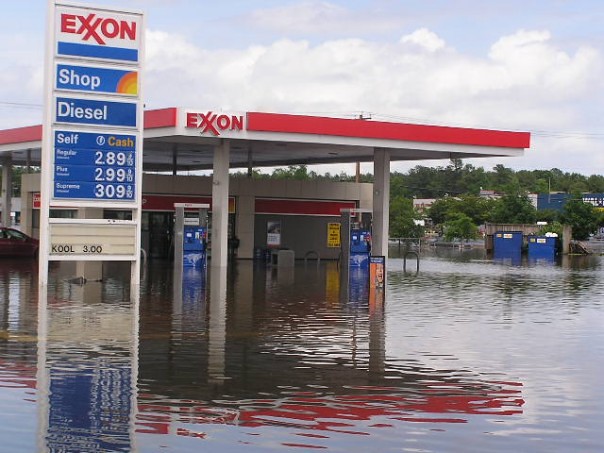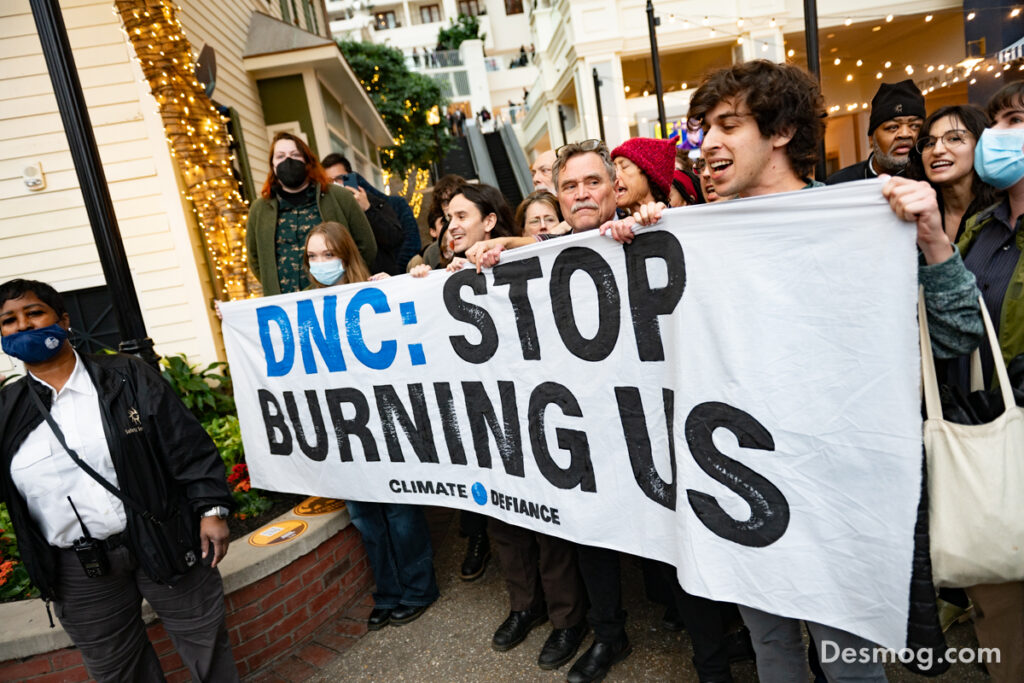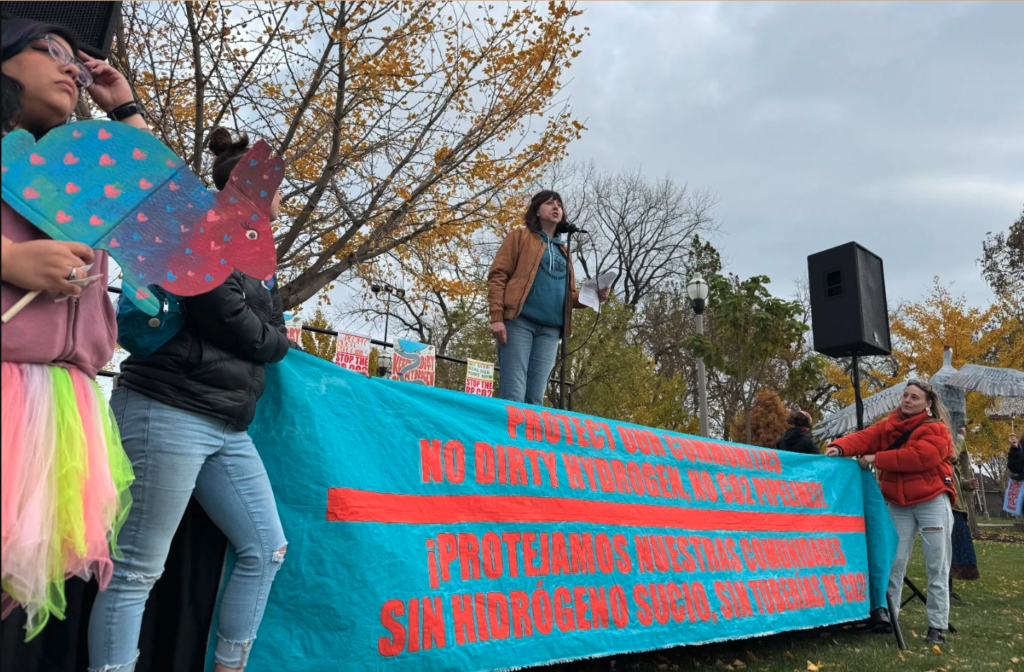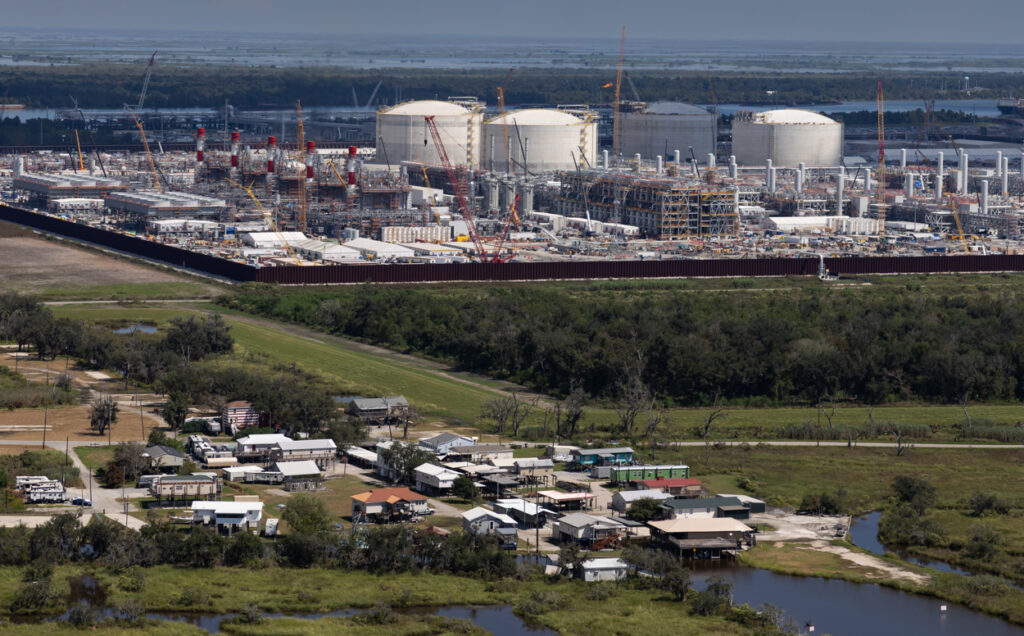By Karen Savage, The Climate Docket. Originally published on The Climate Docket.
Amid a summer rife with climate-related disasters, the liability lawsuits came like an advancing flood, first Minnesota and Washington D.C. within days of each other in June, followed by Hoboken, Charleston, Delaware and Connecticut in rapid succession in September. Their suits have turned a summer of unrest into a quest to make fossil fuel companies pay for the damages caused by the burning of their products, joining a trend that began three years ago but evolving to match the circumstances of today.
This summer, extreme heat blanketed much of the Northeast, with seven states recording the hottest July on record. Wildfires have swept through the west, destroying homes, uprooting lives and searing the lungs of millions with unrelenting smoke. Residents in Louisiana and Alabama have faced a continuing barrage of hurricanes and storms, dumping unimaginable amounts of rain and misery.
Recovery will cost billions and that doesn’t include what’s needed to protect residents from future climate change-related disasters.
The latest round of lawsuits draws from the dozens filed across the country since 2017, but with a few new twists. They continue to charge fossil fuel companies with public nuisance for producing and marketing a dangerous product, but they increasingly allege the companies acted together to also violate state consumer fraud statutes. And for the first time, they have begun to include the industry’s largest trade group, the American Petroleum Institute (API), among the alleged culprits in deceiving the public.
“There is a very strong evidentiary basis for showing that these companies knew about the impacts of climate change and colluded to prevent the dissemination of that information,” said Jessica Wentz, a senior fellow at Columbia University’s Sabin Center for Climate Change Law.
Nearly all the lawsuits have been filed in state courts, alleging state law violations. Fossil fuel companies have doggedly tried to have the cases moved to federal court, where they think they will have a better chance at getting them dismissed, but a string of appellate court rulings have pushed them back to state court. The companies have asked the Supreme Court to weigh in, which seems increasingly unlikely as the circuit courts have all issued similar rulings and the Supreme Court usually only intervenes at this point if the circuits have issued conflicting rulings.
Those decisions have likely encouraged the filing of more suits, a trend experts expect to continue.
New Tactics
Notably, the newer cases have morphed from focusing heavily on nuisance claims, to include claims of failure to warn and creating a public danger, Pat Parenteau, professor of environmental law at the Vermont Law School said.
“Fraud, deceit, that’s really the theme,” Parenteau said.
“We’re seeing these consumer-based cases, and that’s an interesting development, trying to base a claim for damages, not just sort of penalties or traditional enforcement for violating consumer laws, but actual disgorgement of profits and damages for violating the state consumer laws.”
The municipalities’ strongest claims are failure to warn, Parenteau said.
“There’s plenty of evidence now — maybe not for every single defendant, but certainly for the major defendants—to show that they really did know the problem, and in fact, they were taking precautions to protect their own assets from what they knew, and they didn’t warn,” Parenteau said. “Far from it, they conspired to propagandize and confuse and so forth, delay, and I think that’s going to play big time with the jury.”
Minnesota, Hoboken and Delaware added API to the mix as a defendant, alleging the trade group worked alongside the companies in a coordinated campaign of deception.
Parenteau said the API will “fight like hell,” but will have a tough time shaking the suits.
“Their fingerprints are all over these documents in this propaganda and this false advertising and this spin, it’s not like they were passing or innocent bystanders, they’re in the thick of it,” Parenteau said.
The Tobacco Parallel
The obvious comparison for these lawsuits is the fight to hold Big Tobacco accountable for deceiving the public about the dangers of smoking. While the two issues differ in significant ways — the impacts of climate change vary widely by location, for instance, and are much harder to define than a cancer diagnosis — but they both rely on the science definitively linking the harm to the product, known as attribution science.
If tobacco litigation is any indication, attribution science will be key in climate change-related litigation, according to Dr. Benjamin Franta, a postdoctoral candidate at Stanford University who researches the history of the fossil fuel industry.
“[Tobacco litigation] failed for 30 years before it started to succeed and that’s when the winning formula was found, which was to combine the science with the historical research that showed that the companies knew,” said Dr. Benjamin Franta, a postdoctoral candidate at Stanford University who researches the history of the fossil fuel industry.
“That created this moral and legal culpability that came together with the epidemiology — basically the attribution science in that area.”
In the case of Big Oil, linking the burning of fossil fuels with the warming of the atmosphere is fairly well settled, but Wentz said the companies will likely try to cast doubt on that attribution.
“The challenge for petitioners is to show that they have suffered an injury that is linked not only to climate change, but also to the specific contributions of the defendants,” Wentz said at a recent panel on climate litigation hosted by the Union of Concerned Scientists.
Attribution science has advanced greatly in recent years. Work by researcher Richard Heede and others has traced greenhouse gas emissions since the industrial revolution to the 90 top carbon producers. Notably, most of those emissions happened in recent years, well after fossil fuel companies knew the risk their products posed to the climate.
“Science is shifting to be able to not just look at climate change resulting from all human-caused greenhouse gas emissions, now science is increasingly able to attribute changes to specific emission sources,” Rachel Licker, a senior climate scientist at the Union of Concerned Scientists who has studied ocean acidification said.
Scientists are now able to determine the extent to which human activities have influenced climate impacts such as ocean acidification, heatwaves and specific extreme weather events, such as hurricanes and floods, Licker added.
What the Oil Companies Knew and When
Tobacco litigation, which began in the mid-1950s with suits filed by individual plaintiffs, took more than 30 years to succeed in any form. It wasn’t until 1998 — after attorneys general in all 50 states and Washington D.C. took the reins and filed suits alleging violations of state consumer protection and antitrust laws — that the historic settlement was reached, forcing the companies to pay for the harm they had caused.
The AG’s were helped immensely by whistleblowers, including a pretrial deposition given by Jeffrey S. Wigand, a former Brown and Williamson vice president of research and development, who divulged that tobacco companies not only knew the link between smoking and cancer, but had also manipulated research to obscure that link.
Seven attorneys general have already filed climate change-related suits, which means this era of litigation may progress much faster than tobacco. They also already have whistleblowers’ information at their disposal, with much already known about the companies’ deceptive practices.
Reporting by InsideClimate News and the Los Angeles Times in 2015 revealed that Exxon knew about the harmful effects of climate change for decades, yet still funded climate denial campaigns and worked to cast doubt among the public on the imminent impacts of climate change. Those investigations also showed that the other oil companies, along with API, knew of this research as well, worked to lobby against climate action and funded decades of the campaigns that promoted denial.
Franta, along with Naomi Oreskes and Erik M. Conway, Robert Brulle, Geoffrey Supran and other researchers have exposed clear connections between fossil fuel companies and efforts to block policies to curb climate change.
“We found the tip of the iceberg, but through litigation, we can find much more as well and put a stop to bad corporate behavior,” Franta said.
A Tobacco-Style Settlement Is a Long Way Away
According to the tobacco agreement, the attorneys general and the companies settled “to avoid the further expense, delay, inconvenience, burden and uncertainty of continued litigation (including appeals from any verdicts).”
Tobacco companies were required to pay about $12.75 billion up front and must continue to pay billions annually, in perpetuity.
The settlement prohibits companies from engaging in deceptive advertising and marketing campaigns, bans them from hiding the harmful effects of tobacco use and prohibits marketing of tobacco products to children. Certain tobacco front groups were dismantled and companies were required to publicly post documents disclosed during discovery.
Many of the recently filed climate change-related lawsuits seek similar remedies. In addition to asking courts to award damages for harms, municipalities are asking that fossil fuel companies be ordered to stop deceiving the public, to fund public education campaigns highlighting the risk posed to the climate by their products, and to make public all of their climate change-related research.
Although climate litigation has moved faster than tobacco litigation and despite what he referred to as a “veritable tsunami” of recent filings, Parenteau said climate litigation is not yet where tobacco litigation was when settlement talks began.
“There you had a class of people affected health-wise, with very specific diseases, lung cancer and other things, and a pretty defined product and set of defendants,” Parenteau said. “Climate isn’t like that — if it gets to that point where a jury has rendered a liability verdict, then I think they’re going to settle, but even then they’re probably going to settle one by one.”
A global tobacco-like settlement is unlikely, Parenteau said, because the costs are challenging to quantify.
“For the amount of money that certain jurisdictions are already extending, what you would call liquidated damages, I can obviously see that as recoverable — but future damages? What kind of a model are you going to build that you could monetize what those would look like, I have no idea,” Parenteau said.
Far easier to compute is the amount companies are spending on attorneys fees, which Parenteau estimates could already be nearing $20 million.
“It may be that some of these defendants will start to peel off and try to cut their losses and cut some deals,” Parenteau said, adding that there’s no guarantee that even the most high-powered attorneys will get fossil fuel companies off the hook.
In the meantime, Franta predicts the litigation will lead to a better understanding of climate change and the damage allegedly caused by the companies.
“These lawsuits, I think, will drive a much more concrete and precise understanding of exactly what we have lost, exactly how much damage has occurred, where, and also the costs of delay — the cost of what if we had done something more 40 years ago, 30 years ago — what if the companies had not dissembled and denied and delayed, what could we have done.”
Main image: A flooded Exxon gas station in Seaford, Delaware, 2006. Credit: DCist, CC BY 2.0
Subscribe to our newsletter
Stay up to date with DeSmog news and alerts







